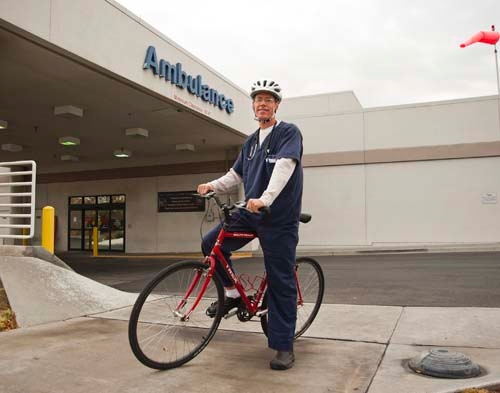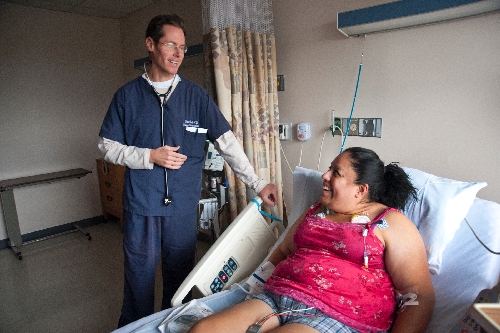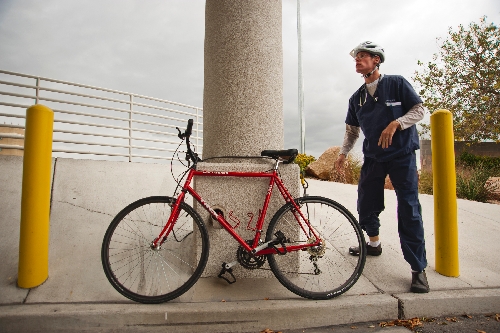Las Vegas doctor’s love of cycling keeps him pedaling all year
Though Dr. David Zipf swears he's not the statement-making sort, the hospitalist delivers one each day when he hops on his 20-year-old bicycle.
And it goes way beyond the "practice what you preach" dilemma of doctors needing to maintain their own physically healthy lifestyle. After all, how many times have we been told to shed a few pounds by an overweight doctor or warned of the dangers of smoking by a physician we catch sneaking a few puffs off a Marlboro during breaks from seeing patients?
For Zipf, 41, cycling centers his life. It's a way of finding a few minutes for himself, for putting things in perspective in a profession where everyone else - by oath - must come first.
"Like actors, at the end of the day doctors are just people," he says.
In his specialty, Zipf sees only hospitalized patients, making rounds at University Medical Center and nearby Valley Hospital, as well as Healthsouth Rehabilitation Center of Las Vegas on West Charleston Boulevard.
But before he makes his patient rounds by foot, Zipf makes his round of care centers on a red Trek hybrid bike. From home to hospitals and back home is six miles. Because he makes several rounds to each of the care centers over the course of what can be 16-hour days, however, Zipf can easily triple those miles.
That doesn't count the occasions when he encounters something so tragic at work - the "sudden death of a young person" is the worst - that he might jump on his bike for a short ride to clear his head. Occasionally, especially after a child's death, it's a quick trip home to hug his wife and two children and tell them that he loves them.
"It's a good way to de-stress," Zipf says of riding his bicycle. "This environment is so intense, and there's so many hours to it, it's like a brief period of the day when you're by yourself.
"You're outside, getting some fresh air and you can decompress a little bit. You're taking some time and doing something for yourself, something that's good for you."
Both mentally and emotionally as it is physically, he says.
Zipf got on his bike initally after finding that when he drove to work, he wasn't making time for exercise.
"The days were just too long to find time to go to the gym," he explains.
Zipf says he doesn't feel forced to do what he does. Rather, he feels compelled by its benefits.
Zipf first came to love riding a bike as a second-grader, and from there it became a child-to-adult passion prompted by independence (teen years), necessity (college and medical residency) to healthfulness (adulthood).
"I have a car, but I rarely use it," he says, adding that he even biked to and from work when he lived in Summerlin. He now lives near the intersection of Rancho Drive and Palomino Lane.
The summer heat doesn't bother him, and the only days - "maybe four or five a year" - when he doesn't ride his bike is when heavy rain is falling or forecast because of the increased possibility of traffic accidents.
Even on clear days, Zipf frequently passes on using busy West Charleston in favor of side streets with less traffic.
Zipf says he is the only doctor he knows who bikes to and from work, much less between hospitals, although he concedes there may be others. He says his co-workers respect his drive, even if they prefer to drive.
"I tell him, 'I love you tree-hugging types. When I see you cycling, it makes me feel less guilty that I'm driving one of my big gas-guzzlers,' " says Dr. Neel Dhudshia, a local thoracic surgeon and eight-year friend of Zipf.
"Really, I'm just busting his chops. He's a good guy, and I think what he does is good. ... I can't do it because I'm a surgeon carrying operating equipment and I can't put those on a bike. But he's found a way to help take care of himself, and that's good."
Zipf says he only mentions his cycling to patients if they ask his advice on healthy living. One of his occasional patients at Valley, 36-year-old Tanya Sotelo, says she was aware of his biking and admires him for it.
"I think that's awesome that he does that instead of driving a car," says Sotelo, who undergoes routine plasmapheresis for myastenia gravis, an auto-immune disease. The disease affects the body's neuromuscular system, and the treatment is a form of purifying the blood system of the affecting antibodies.
"He's a really good doctor, very caring of his patients," Sotelo adds. "And he doesn't just talk about being healthy. He lives it."
Zipf says it can be difficult for many doctors to find the means to take care of themselves, and that's because at the end of the day - like actors - they're just people. Long days leave them tired and, as such, fans of the expediency of less-nutritious foods.
"We tell our patients what they need to do be healthy - this is what you need to eat; you need to exercise every day. But the truth is," he says, "most of us are so busy that we almost never do anything for ourselves.
"Here, we eat on the run, and by the time we get home, there isn't time to exercise. There's no time or energy to practice what we preach."
Not that Zipf is the preachy type.
"I'm not out there saying this is what you should do," he says of his fellow doctors - or anyone who lives a hectic lifestyle where exercise becomes an afterthought. "But I do think it's the right thing to do."
Contact reporter Joe Hawk at jhawk@reviewjournal.com or 702-387-2912. Follow him on Twitter: @RJroadwarrior.



















